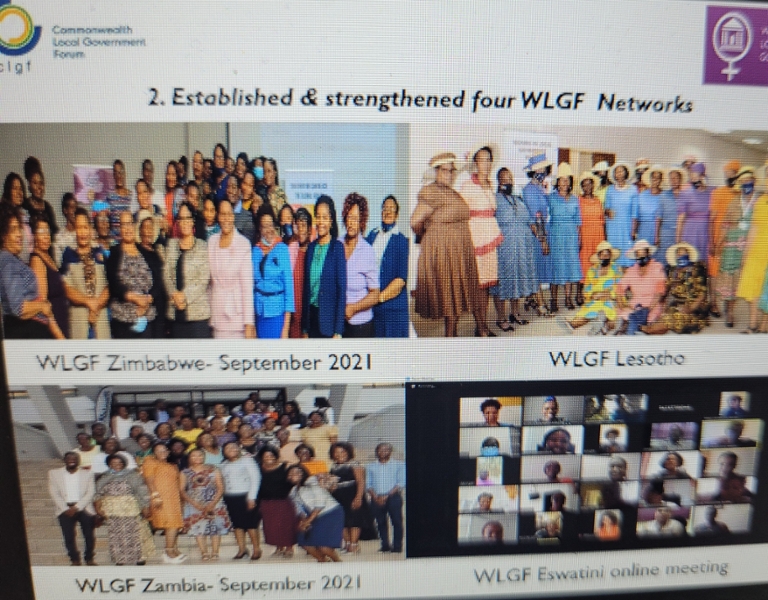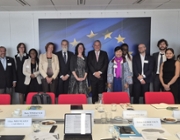Women in Southern Africa: sharing lessons of political empowerment

21 April 2022
Women’s political empowerment is key to all functioning democracies, and nowhere more so than at the local level where decisions affecting our daily lives are made. As a major programme - Connecting the Dots Project: Support to young women in local government to increase political participation - comes to a close, CLGF’s dissemination workshop enabled partners in the four countries to share their experiences revealing a number of similarities and several practical suggestions that can be implemented anywhere, to increase the involvement of women in decision making.
Welcoming more than a hundred participants to the event, CLGF Secretary-General, Ms Lucy Slack, set the scene by saying that, although constitutional and legislative change helps to empower women politically, this doesn’t always accord with what is happening on the ground; and emphasised the importance of local government leaders to inform the process.
Longer hours, lower wages
In general, women work longer hours, receive lower wages, suffer patriarchal traditions, and have less access to education, markets, or land. This has been exacerbated by the global pandemic, which has exposed the deep-rooted inequalities. This is why CLGF is intent on championing the cause. Ms Slack explained that the event was intended to disseminate the outcomes of the Connecting the Dots project and share the experiences about strengthening networks to increase the number of women in local politics. Although there are many processes in place, ensuring this is implemented at the local level, and includes young girls, boys and men, as well as women, is critical.
CLGF Chairperson Rev Mpho Moruakgomo added his welcome, saying that the launch of CLGF’s Commonwealth Women in Local Government network (ComWLG) in 2017, was a milestone – as is the successful completion of this project. ComWLG is a network of networks and has an overarching role in supporting in-country networks across the Commonwealth: gathering best practice and making it available to the CLGF membership; encouraging councils to embrace the campaign; driving advocacy, data collection and research pilot projects.
Access to finance
Thanking the project participants for sharing their experiences, particularly the lessons learned about what works and what doesn’t, he stressed that the reality is that we still have a long to go. Women continue to face social and cultural barriers which need to be overcome, together with a lack of access to finance; councils are not gender responsive enough; and quotas and monitoring are vital to increasing the number of women politicians and senior practitioners.
Feeding into CHOGM
He explained how this event will feed into the Southern Africa regional event from 3 to 5 May, and to CHOGM – the Commonwealth Heads of Government Meeting – in June. In conclusion, he said: “Gender equality is in everyone’s interests not just women, and it needs men and women to work together.”
The keynote was delivered by the Chairperson of the Commonwealth Women in Local Government Network, Hon Thembisile Nkandimeng, the Deputy Minister of COGTA and a former mayor and president of the South Africa Local Government Association, SALGA. She reminded everyone that the challenges facing women are not unique, and the remedies found can be used by everyone. The barriers are common in campaigning for gender parity at all levels and as women, she said, we deserve so much more. With first-hand knowledge of the challenges of being a leader in society and a leader in the home, raising families, the pandemic had predominantly disadvantaged women. In many parts of Southern Africa, 60% of incomes have been lost, and this burden has been deeply felt by women, who take the major role in caring for families. Girls have historically been encouraged to fulfil passive roles, not to lead; and there is a great responsibility to raise the girls who come after us differently.
Reality of violence
Gender based violence is a reality that many women face, simply when walking home or in their own homes, and the economic and social needs must be addressed. According to the South Africa Electoral Commission, the most recent elections returned 63% male and 37% female politicians – a setback from a 50/50 target. She appreciated the more favourable picture of leadership in other countries, including Rwanda, Liberia and Zambia, and the numbers of women politicians in Ghana, Sri Lanka, Uganda and New Zealand which are moving in the right direction. She explained that Connecting the Dots "is all about finding sustainable ways to support women in leadership and ensuring that male counterparts work with us, is critical."
Recognising the importance of capacity building for leaders, COGTA and SALGA provided training of all female mayors in Cape Town. The legacy of Connecting the Dots is not just about advocating for an increase in women politicians, but also supporting them across the region in performing their duties and seeking re-election. Digital tools are being created in the Caribbean and Asia, allowing the sharing of best practices on all levels across the Commonwealth and feeding into Sustainable Development Goal 5. She said that the women’s networks are not just about those already participating, but should provide a platform for any woman or girl.
Setting the scene
CLGF Regional Manager for Southern Africa, Ms Nyasha Simbanegavi, kicked off the second session which aimed to provide reflections on the project’s implementation, including an overview, strategies used, results, lessons learned and recommendations. She gave a brief decription of the project, explaining that it was funded by the UK Foreign, Commonwealth and Development Office (FCDO) to the value of £1m, for a period of two years, across four countries. Despite being implemented during Covid, it was delivered on time, and to budget with 4362 direct beneficiaries. Focusing on political and economic empowerment of women and girls, this event was focusing on increasing women’s participation in local government, as both politicians and senior practitioners.
Outcomes
Participants in each of the four countries contributed to the design of programmes and strategies to increase women’s participation and develop monitoring and evaluation processes. The project led to the establishment of four Women in Local Government networks. In Zimbabwe, the two existing networks focusing on urban and rural were brought together as one; there was no previous network in Lesotho; in Eswatini, they broadened out their network to include officers, as well as politicians. The networks were strengthened through the creation of strategy documents; these were customised to local circumstances, understanding what the local problems were, rather than assuming. Mentoring schemes linked young women with existing councillors, who introduced them to council meetings and practices. Of the 186 young women participating in the projects, more than 118 expressed a wish to take up a position in local government.
Stories of change
Mobilising young people to play a greater role in local government is vital, not only to lobby for gender parity, but also to ensure they have a voice about the services they need. Ms Simbanegavi said that 164 Stories of Change had been collected which asked women to reflect on their personal journeys throughout the project with profound outcomes, and these would be published on the website soon.
Connecting the Dots had created a platform for women and will continue; there have been two dialogues about the projects, and eight summits, two in each of the four countries, to allow a dialogue at the national level. She summarised the general benefits as increased networking, greater solidarity, cross party working and uniting on an inter generational basis, increasing skills and knowledge, building confidence – with a 1% increase in the number of women holding senior positions; there have been policy and legislative changes in Zimbabwe with a 30% quota for the next election.
Back to News





